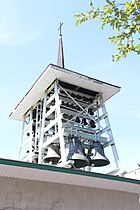A carillon is a pitched percussion instrument housed in a bell tower and played with a keyboard. Consisting of at least 23 cast bronze bells in fixed suspension and tuned in chromatic order, carillons are usually owned by churches, universities, or municipalities. The bells are struck with clappers connected to a keyboard of wooden batons played with the hands and pedals played with the feet. They are among the world's heaviest instruments, usually between 4.5 and 15 metric tons (5.0 and 16.5 short tons). The tuned carillon was invented in the Netherlands in 1644, cast by Jacob van Eyck and the Hemony brothers. Today, most are found in and around Belgium, the Netherlands, and northern France, though nearly 200 are in North America. Almost all existing carillons were built in the 20th century. In 2014, UNESCO recognized the carillon cultures of the Netherlands and Belgium as part of their intangible cultural heritage. (Full article...)
